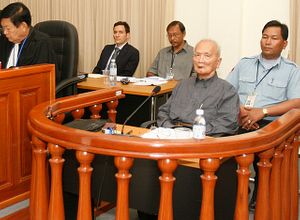It was a word that gave meaning to the greatest crimes of the 20th century. Spawned from the massacre of the Armenians during World War I and the final days of the Ottoman Empire, the term genocide was set in stone following the Holocaust and has since become synonymous with Rwanda, Darfur, Bosnia and Cambodia.
But the man who coined the phrase, Raphael Lemkin, had been largely forgotten by history until recently, when A Problem from Hell: America and the Age of Genocide by Samantha Power was published, and sparked an academic push to raise Lemkin’s stature and find a more fitting place for his work within the public conscience.
He has been described by some as a slightly obnoxious crusader, obsessive and annoying, but Peter Maguire, an academic, authority on the Khmer Rouge Tribunal and author of Law & War said Lemkin’s work was useful for planning the Nuremberg war crimes tribunals after World War II.
“Not content to simply try individuals for recognized violations of the laws of war, the architects of the Nuremberg trials proposed trying Nazi organizations for conspiring to commit aggressive war and borrowed Raphael Lemkin’s argument from his book Axis Rule in Occupied Europe.”
“Lemkin held that the SS, Gestapo, and other Nazi organizations were an international version of La Cosa Nostra – a criminal organization of volunteer gangsters,” Maguire added. “The concept of conspiracy would also close legal loopholes that might allow guilty men to escape punishment.”
Lemkin was Polish, born into a poor Jewish family in 1900, and coined the phrase genocide by combining the Greek word “genos,” which means race or tribe, with the Latin word “cide,” meaning to kill – in 1944 after escaping Axis rule in occupied Europe.
His work is also about to find additional stature in Cambodia, where surviving leaders of the Khmer Rouge – Nuon Chea and Khieu Samphan – are about to go on trial for genocide. And a separate verdict is expected on August 7, in their case of crimes against humanity.
Youk Chhang, Director of the Documentation Center of Cambodia has spent almost two decades collating evidence of atrocities committed by the Khmer Rouge for a trial of surviving leaders currently underway in Phnom Penh.
He said one of the principal struggles the world faces in preventing genocide has remained unchanged for the last 60 years.
“Discrimination, racism, bullying and the entire spectrum of inhumanity that leads up to the legitimization of violence on fellow human beings is dealt with at the individual and community level, and there is no more efficient medium for dealing with these preconditions of genocide than the medium of genocide education.”
Pol Pot ruled Cambodia with a brutal and methodical hand between 1975 and 1979 when up to 2.2 million people were exterminated or died through starvation and illness while working as slave labour. Muslim Chams and ethnic Vietnamese were among those targeted.
“For genocide prevention to be truly sustainable,” Youk Chhang said, “it must not only be universally acknowledged at the international level but also cultivated at the grassroots. Education must be the next step forward in our collective work to realize a world without genocide.
“Lemkin reminds the world, and in particular Cambodia, that genocide will continue to happen because it is a political act and that we need not only to punish those who commit genocide, but also prevent it from happening again and again.”
Lemkin’s fascination with genocide dated back to the mass killings of the Armenians by the Turks, and this was reinforced by the extermination of the Jews in his native Poland. He pushed the U.N. to outlaw what became known as the “crime of all crimes,” and was subsequently shortlisted twice for the Nobel Peace Prize.
He lectured at Rutgers and Yale but fell into obscurity and died in New York; destitute, unknown and until recently, largely forgotten.
In April during Genocide Appreciation Month, scholars were actively promoting Lemkin with the publication of an autobiography, graduate research at Rutgers, a Sundance award-winning documentary on his legacy, and a UN award in his name.
Luke Hunt can be followed on Twitter @lukeanthonyhunt.

































